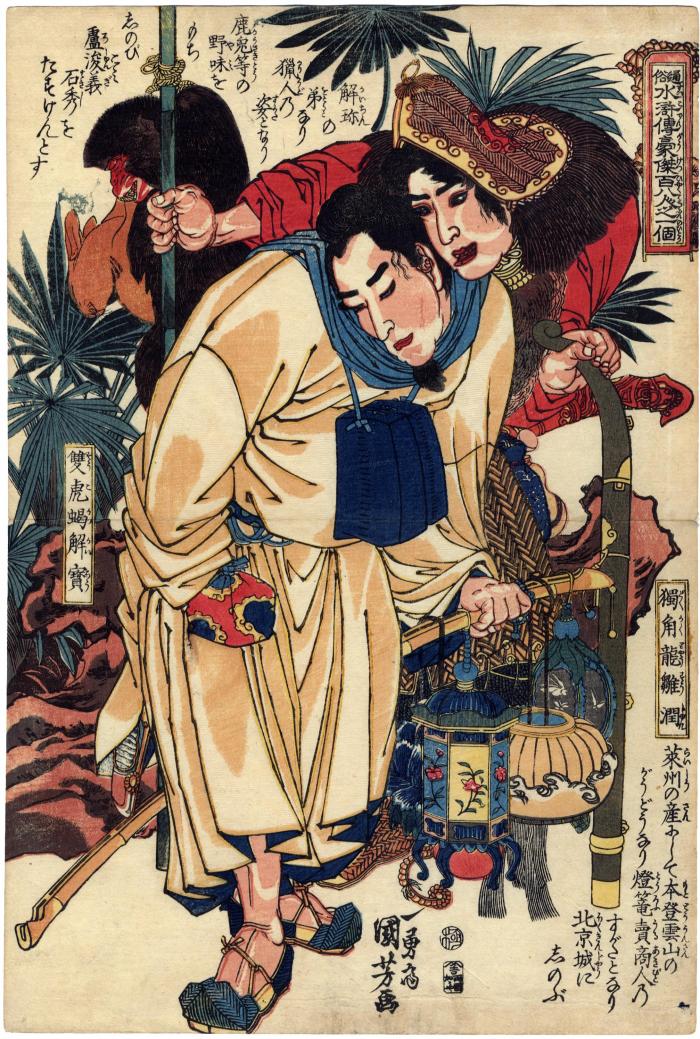Utagawa Kuniyoshi (歌川国芳) (artist 11/15/1797 – 03/05/1861)
Xie Bao, the Twin-Tailed Scorpion (Sobikatsu Kaihō 雙尾蠍解寶) and Zou Run, the One-Horned Dragon (Dokuakuryū Sūjin 獨角龍鄒潤) from the series The Hundred and Eight Heroes of the Popular Suikoden (Tsūzoku Suikoden gōketsu hyakuhachinin no hitori - 通俗水滸伝豪傑百八人之一個)
1827
10 in x 14.75 in (Overall dimensions) Japanese woodblock print
Signed: Ichiyūsai Kuniyoshi ga
一勇斎国芳画
Publisher: Kagaya Kichiemon
(Marks 195 - seal 22-027)
Censor's seal: kiwame
Museum of Fine Arts, Boston
British Museum
Ritsumeikan University
Tokyo National Museum
Lyon Collection - another copy of this print
Nationaal Museum van Wereldculturen (Rijksmuseum Volkenkunde, Leiden) via Ritsumeikan University
Inge Klompmakers wrote about this print:
"Sōbikatsu Kaihō hails from a family of hunters and is Ryōtōda Kaichin's... younger brother. Like his brother, Kaihō has dark-coloured skin and two fierce devils are tattooed on his legs. In addition to his talents in wielding the forked spear, he is also prone to extraordinary shows of strength when angry. The hunter could pull a tree up by its roots, cause mountains to tremble on their foundations and jump enormous heights. Kaihō and his brother are falsely accused of tiger theft in chapter 48 and are sent to prison. Following their escape by Botaichū Kodaisō... and others, the brothers enlist in the Ryōsanpakū ranks and help in the battle against the village where Kojōsō Jisen... is being imprisoned."
"Together with his uncle Shutsurinryū Sūen..., Dokukakuryū Sūjin is the leader of a large robber gang. In chapter 48 Botaichū Kodaisō's husband, Shō'utsuchi Sonshin, visits both men and requests assistance in liberating the brothers Kaichin and Kaihō from prison. Sūjin and Sūen agree; after this rescue operation they also become members of the Ryōsanoaku gang."
"The print of Sūjin and Kaihō refers to chapter 65 when Gyokukirin Roshungi... and Henmeisanrō Sekishū... are being held in a Peking prison. The Ryōsanoaku heroes want to free them during the annual Feast of lanterns. Concealed as travellers and merchants, many of the bandits enter town and mingle with the townspeople. Others assume positions outside the city walls and this plan of attack will enable them to attack Peking effectively from both inside and outside. Kaihō and Sūjin come to Peking disguised as a hunter and a lantern seller. Sūjin, who is depicted in the foreground, carries a bamboo stick with several lanterns attached to it and Kaihō is whispering something in his ear. A monkey and a hare, the catch of Kaihō's so-called hunting trip, are visible in the background."
Klompmakers pointed out in a footnote that Robinson had confused the identity of these two characters. However, the translation of the text on the print makes clear which is which.
****
Xie Bao is first mentioned in Chapter 49 of the story of the marsh bandits. "At the foot of the mountain lived two brothers who were hunters. The elder was called Xie Zhen, the younger Xie Bao. Both used two-pronged spears of steel-flecked iron and were remarkably skilful fighters. They were considered the best huntsmen in the prefecture. Xie Zhen's nickname was Two-Headed Snake, Xie Bao's was Twin-Tailed Scorpion. Their parents were dead, and they had never married. The elder was tall, ruddy complected, with a narrow waist and broad shoulders. The younger, an even tougher fellow, was still taller, with round face, swarthy skin, and two flying demons tattooed on his legs. When possessed by one of his terrible rages, he wanted to pull up trees, shake monuments, and turn earth and sky upside down."
****
This print is listed as #42 in Klompmakers book, Of Brigands and Bravery.
There are two copies of this print in the Lyon Collection. See also #975.
****
The text reads: 莱州の産にして本登雲山のがうどうなり 灯籠売商人のすがたとなり北京城にしのぶ」「解珍の弟なり 猟人の姿となり鹿兎等の野味をもちしのびこみ盧浚義石秀をたすけんとす
****
Ilustrated in a full-page color reproduction in Of Brigands and Bravery: Kuniyoshi's Heroes of the Suikoden by Inge Klompmakers, Hotei Publishing, 1998, #42, p. 139.
Kagaya Kichiemon (加賀屋吉右衛門) (publisher)
Suikoden (水滸傳) (genre)
